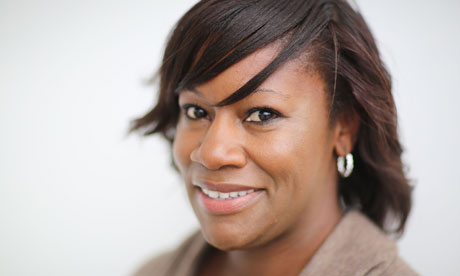
Kimberly Seals Allers is so animated, her bracelets are rattling. The journalist, author and advocate is in London on a short visit to drop her children off for a summer with their British father – the "was-band", she calls him, with a grin – and we've met to talk about her various projects, including the launch of her Black Moms Movement in the UK next month.
Launched in the US in 2008, the movement follows the success of Seals Allers' Mocha Manual series of books. Her "vision was to create a kind of 'Dummies' series, but unique to women of colour because in so many areas of our lives, our journey is very different," she says.
While writing a book on pregnancy, she discovered some troubling information. "I was struck by the poor birth outcomes (infant death, maternal death, low birth weight and pre-term birth rates) that were happening to college-educated black women. There was an understanding that women of lower socio-economic status would have poorer birth outcomes, but they were studying college-educated black women and we were having the same outcomes as our less-advantaged sisters and no one could figure out why. After all, these women are working, they're more likely to have healthcare, and they go to the doctor. And so they've begun to look at the role of stress and how that impacts black women. And I'm not talking about 'I'm gonna take a bubble bath and have a glass of pinot grigio' stress'.
"In America, the black infant mortality rate is twice as high – our babies are dying at twice the rate of white babies." The Centre for Disease Control (CDC) has the infant mortality rate at 6.7 per 1,000 live births for white women, compared with 13.3 per 1,000 for African Americans. Something else troubled her. "Black women have, for the past 40 years, significantly lagged behind white women in our breastfeeding rates," says the New Yorker. Seals Allers wants to change the way people see breastfeeding. "I feel like a lot of women think that they're choosing to breastfeed or formula-feed, but they're actually responding to messages that we receive from marketing, and that we pass down culturally." She applauds pop star Beyoncé for breastfeeding her daughter in public recently.
"That was important for black women. There's a stereotype among black women that the kind of woman who breastfeeds is more like Erykah Badu. So when I show up, I'm like: 'Listen. I'm chemically dependent – that's my hair – and I'm rarely without three- or four-inch heels. And I'm a breastfeeding mum.' A lot of times, people don't expect to see me as a breastfeeding advocate."
Her own mother "did not breastfeed us for any real duration" but Sears Allers nursed both her children for a year, despite some resistance. "A relative said to me that breastfeeding was for poor people," she says.
No one seems to have the answer for the low breastfeeding rates among black women in America, though there are many theories. "When white women stopped, we stopped too. Now Angelina Jolie and Gisele are breastfeeding and white women are too, [but] black women did not follow suit," says Seals Allers.
"There is no money to be made in breastfeeding. The infant formula industry is run by the pharmaceutical companies, and there's a huge profit motive," she adds. Then there are the stories of nursing mothers being kicked off planes and out of shopping malls. "People see feeding as indecent. It is perfectly OK to use breasts to sell chicken wings and beer but not to be used to feed a child. We have to take back our breasts and stop women feeling like they're in some sort of fringe culture for breastfeeding."
Mocha Manual also has a thriving online community, with an average of 20,000 unique visitors every month, and is one of only a handful of big parenting blogs with a focus on black parents. Seals Allers is vocal about the lack of diversity at blogger conferences. "Privilege allows you to be ahead of black people if you're white, and that's what's happening in the mum blogger space. The assumption is that black women are good enough to raise other people's children, but we're not good enough to raise our own. It's a problem that we are never portrayed as nurturing mothers who are actually intentional parents. That's what we're working against."
On the Mocha Manual website, black parents talk about the issues that affect them. High on that list is overcoming stereotypes. "We once had a piece about black boys and black male achievement at school. One woman left a comment that her son is very muscular and they're like: 'Oh, he's going to be a football player.' She said she always says: 'No, he's going to be a husky surgeon.'" She laughs.
Recently made a fellow of the Institute for Agriculture and Trade Policy, her role as a breastfeeding champion with the Department of Health and Human Services took her to the White House where she met Michelle Obama, who has been vocally supportive of breastfeeding. Does she feel things changed with the Obamas' presence? "Most of the places where I've worked, when they have one black person, they feel like that one person can represent all people." She smiles wryly. "I fear that's what happened with the Obamas. Once they became the first family, everything else became, 'well, you have them!'"
She is currently writing a book about breastfeeding, due out late next year. "That whole battle we have about what's a good mother or a bad one, that's a problem," she says. "It's bad for mums and a tool for the marketing people. It has to be addressed."

